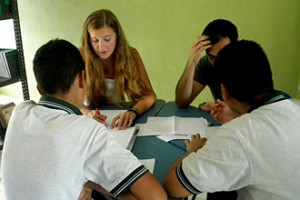Teaching in Costa Rica – Calculating your monthly budget can be a frustrating exercise for ESL teachers. When comparing your fixed expenses to the salary you earn, often times a glass of wine or two is needed to cope with the final numbers. We’ve discussed in this space previously that many teachers increase income by working for multiple schools simultaneously. But an often forgotten element to the Costa Rican ESL teaching market is that of private students.
 In today’s world the notion of having one single employer is a fading one; this is even more relevant in ESL teaching in Costa Rica. Out of financial necessity, most teachers have multiple income streams. Some work for multiple institutions. Others work in another industry altogether. But many take advantage of the never-ending market that is teaching privately.
In today’s world the notion of having one single employer is a fading one; this is even more relevant in ESL teaching in Costa Rica. Out of financial necessity, most teachers have multiple income streams. Some work for multiple institutions. Others work in another industry altogether. But many take advantage of the never-ending market that is teaching privately.
While it’s never going to be a source of primary income, teaching private students outside of your language school job is a great way to make extra money. With English being a language in such high demand, there is never a loss of people looking for classes. The most common places to find such students are through friends. Postings of your services in local universities, libraries and on Craigslist are also great ways to gain interest.
Like most things, it comes down to money. Teaching privately is simple in theory but can often become complicated in practice. Many searching for English lessons are doing so because they can’t afford to take lessons through a local school.
An offer for an intercambio relationship is usually the first step. For those looking for Spanish practice this is the ideal. However, for those thinking income first, this doesn’t work. With a teacher needing to make enough per hour to make it worth their while, the most common compromise is to find a group of two or three interested students who can split the hourly rate. This way the teacher still makes their fair share and the cost on the students’ part is manageable.
While a great way to earn extra cash, where a lot of teachers get caught is in the catch-22 of the private market.
In Latin culture, attendance at English classes is spotty at best. For private sessions, this can be extrapolated tenfold. This is the main reason why it is extremely risky – or even foolish – for a teacher to depend solely on private students for income. Even if they really enjoy the class, the desertion rate is extremely high.
Enjoying the class is a barrier in and of itself. When you are teaching on your own you have the freedom to mold the class to your students’ needs. However, with this freedom comes the challenge of having students who think they know what they need. A clear establishment of your skills and ability to gauge both proficiency level and an accurate needs assessment from the very first day is vital in retaining these types of students. Without this, it can be easy for them to leave you for another offering of similar classes elsewhere.
If you want more information about teaching English in Costa Rica or getting your TEFL or TESOL certificate in Costa Rica feel free to contact Andrew at the Global TESOL College or email andrew@globaltesolcostarica.com
Originally from Toronto, Canada, Woodbury is the academic director of Global TESOL College Costa Rica , a contributor to radio program This Week in Costa Rica (http://thisweekincostarica.com/), and an independent writer based in Costa Rica.

